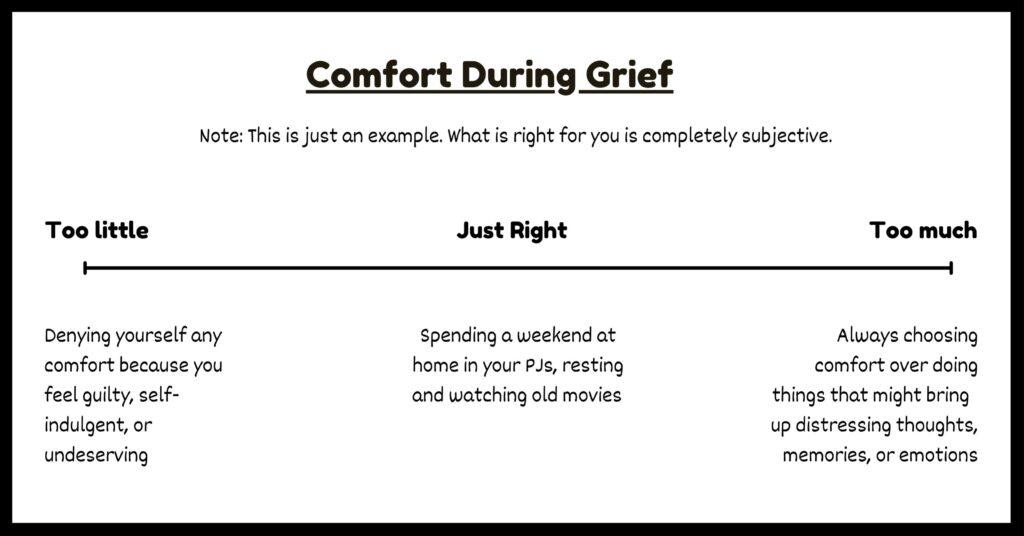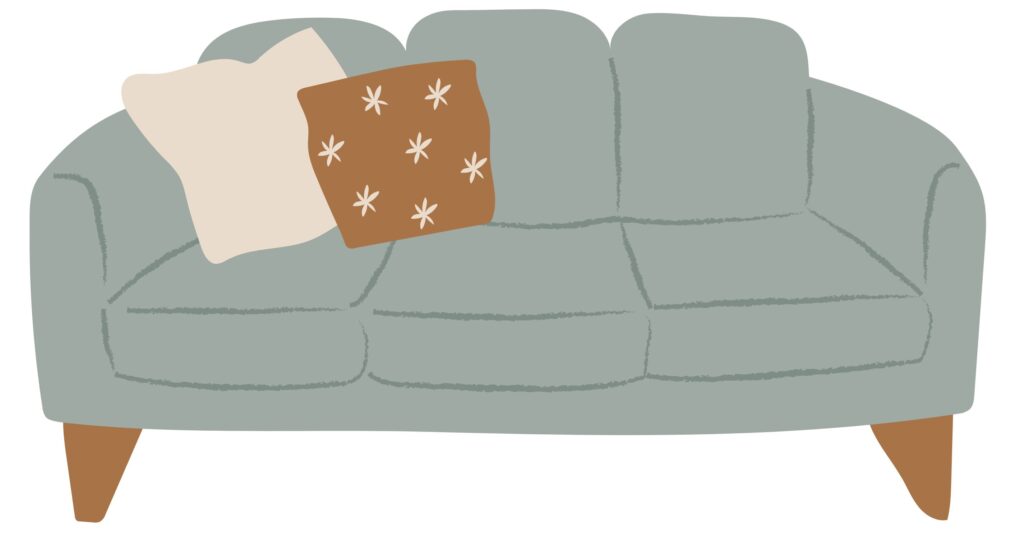Seeking Comfort During Grief: Too much, too little, just right
/ Understanding Grief : Eleanor Haley
Comfort is one of my favorite words in the English language.
Like many people, I crave comforting things. For example, comfortable shoes with no heels, pants with no waistband, temperatures that are not too hot or cold, foods that don't scare me, low-risk social situations--I could go on.
But who among us does not like comfort? Humans and other animals crave it from the time they are born. Does anyone remember Harlow's rhesus monkey experiment from Psych 101? I'll refresh your memory.
Harry Harlow removed baby monkeys from their mothers hours after birth (rude) and placed them in an environment with inanimate mother surrogates. One surrogate was made of wire but also provided food from an attached baby bottle. The other was made of terrycloth but provided no food. He wanted to see how the monkeys responded to and interacted with these surrogates.
Before this experiment, many theorized that the basis of bonding between caregiver and child was that the caregiver meets the child's need for food. If this were true, Harlow's monkeys would theoretically have preferred the wire mother with the baby bottle. However, throughout Harlow's experiment, he found that the baby monkeys spent significantly more time with the cloth mother, who provided comfort, security, and affection, and only went to the wire mother for food.
I guess we can conclude that, for baby monkeys, love and affection ranks high on the list of needs and desires. But we know this is true for human babies as well. We see babies seek comfort in many ways, like reaching for a caregiver, sucking their thumb, or snuggling a cherished stuffed animal. And comforting caregiver qualities like reliability, consistency, and nurturing help foster the child's sense of trust, safety, and security in the world.

Comfort During Grief
Comfort is a natural desire, which may be especially strong during times of pain and uncertainty--like after experiencing a loss. After a loss, comfort may qualify as a basic human need as it can help create a sense of security, safety, and stability in a world turned on its head.
No one would fault you for seeking heaps of comfort during grief any more than they would fault someone for looking for water when lost in the desert. Though nothing can make right what feels very wrong, things like a hug from a friend, a piece of clothing that belonged to the person who died, a comfort television show, or the security of home can connect you to those you love (both alive and dead) and provide a soothing and calm cocoon that drowns out the fear and unknown for a little while.
So, we can agree that comfort is generally good and comfort during grief is essential. So where's the catch?
The Comfort Continuum
At WYG, we like to play a little game called 'Too Much, Too Little, Just Right.' To play the game, we look at a specific behavior on a continuum and ask ourselves if we can envision how too much or too little of this behavior could be negative because it enables a person to avoid, or to deny themselves self-compassion, basic needs, time to grieve, etc. When we do this, we see how some behaviors that look constructive at face value can come to serve a different purpose.
It's worth noting that only you can decide the role a particular behavior plays in your life. Something that feels 'just right' to someone else may be 'too much' for you. The age-old questions of "How's this working out for me?" and " How does this make me feel?" are usually good places to start.
Opting for comfort over discomfort is one behavior we can undoubtedly place on this continuum. I will use myself as an example because gossiping about others is rude. My comfort zone equals home + couch + blanket + TV, even though I'm often very bored and frustrated with how I spend my time. And so I've been thinking about the vast chasm that sometimes exists between the things I believe will make me feel good, happy, healthy, and fulfilled and the things that I opt to do instead because of an intense desire to feel comfortable.
Before thinking about this, I would have always lumped "comfort" in with good, healthy, and happy. However, the more I self-reflect on the motivations behind my choices, the more I realize that I often choose the comfortable situation (staying home, sitting on the couch, not doing things) because it makes me feel safe and at ease while opting not to engage in the world in ways that might bring me other positive experiences because some element of it seems hard or anxiety producing.
Here's a concrete example that has nothing to do with grief:
Let's say I've received an invite to a party. I've been feeling down lately because I don't get out much, and I'm lonely and a little restless. I know a few people going to the party and, in theory, it sounds fun. So one might think I'd jump at the chance to go to a party. Right?
Wrong! The party involves many difficult things - getting dressed, driving there (not to mention parking!), and potentially awkward social scenarios. Even though the payoff of getting out of the house and interacting with people seems aligned with what I want, it feels harder than staying home in my PJs. In the end, I stay home.
And here's a grief-related example of comfort on a continuum:
Sometimes, comfortable, relaxing, non-threatening, self-soothing experiences are exactly what you need in grief. We recommend a healthy dose of these things. However, learning to live in the world after loss often means fighting through some really uncomfortable stuff to regain a sense of meaning, purpose, and connection. And while choosing to stay on the path of least resistance feels easiest, you may find that this path only goes in circles.
That said, it's may not be helpful to deny yourself comfort altogether. For example, many people will deny themselves the right to grief or receive support for their grief because they feel undeserving. Or perhaps they believe comforting things are self-indulgent, or they feel guilty experiencing anything positive because they're supposed to be grieving (note: experiencing positive emotions does not mean you're not grieving).

Allowing Discomfort to Exist
While comfort is generally good, seeking it may sometimes be at odds with experiences that align with your wants, desires, values, and purpose. Speaking personally, I often must remind myself that experiences aren't either/or -- positive or negative, painful or pleasant, comfortable or uncomfortable.
When I was a kid, we swam in a pond. It wasn't a nice chlorinated, heated pool. It was a COLD, upstate NY body of water with seaweed, algae, snakes, and anything else we could imagine swimming below the dark surface. I loved swimming in that pond, but getting in was always misery. So we told ourselves if we just dove in, did ten bobs up and down, by the end, we'd be used to it. And you know what? We always were.
Many pleasant or positive experiences require you to push through a little discomfort. Sometimes you have to jump in, do ten bobs, and remember the pain won't last. And if it stays uncomfortable, remember there's comfort to be found in uncomfortable situations as well. For example, the memory of your loved one. The ability to take a moment to yourself and breathe. Permission to leave an experience you hate. Or the simple knowledge that at night's end, your comfy couch will still be at home waiting for you.

We wrote a book!
After writing online articles for What’s Your Grief
for over a decade, we finally wrote a tangible,
real-life book!
What’s Your Grief? Lists to Help you Through Any Loss is for people experiencing any type of loss. This book discusses some of the most common grief experiences and breaks down psychological concepts to help you understand your thoughts and emotions. It also shares useful coping tools, and helps the reader reflect on their unique relationship with grief and loss.
You can find What’s Your Grief? Lists to Help you Through Any Loss wherever you buy books:





Colleen August 31, 2023 at 5:26 pm
This article has helped me so much. My husband has AML I’ve been beside him watching him suffer, he use to weigh 210 pounds, he now weighs 113 pounds or less. I suffer with him. This is breaking my heart, this is so deep within me. I want so badly to save him, although I can not. At times I am so afraid and feel like a lost little girl, some days I am numb other days I am as strong as a ox I don’t know how I will continue life without him. I know I will get through this as long I have articles like this to read. It makes me realize I am not alone in this struggle. Thank you for sharing your wisdom.
Archie July 30, 2023 at 10:53 am
Our son of 39 pasted in May this year.
Although there are a vast amount of different sites for grieving advice I definitely have this one saved.
I also purchased your WYG book from Amazon.
Lots of helpful advice.
Thank you.
Archie.
Margaret C July 17, 2023 at 9:31 am
I lost Jon,my Husband of 38 years eight years
ago and Michael my Adult Son 1 1/2 years
ago.
I am a retired Social Worker.
Your info is very very helpful.
Charlotte P June 24, 2023 at 1:33 am
I don’t know how you do it. The WYG emails seem to come at just the right time. The last 2 really hit home for me to describe alot of what I’m going through. I am learning so much from you. It is so helpful to know what I’m feeling is somewhat normal. So many things go on I never felt before. I miss my husband so much. It’s been 4 1/2 years. Thank you for helping me.
Gigi July 8, 2023 at 12:02 am
All the best to you Charlotte, know you are not alone in this.
Kim June 22, 2023 at 9:13 pm
I LOVE your site, and pass it along to anyone who is grieving. As a former Stephen Minister, (I have none in my area) grief graduate of Georgian college, and grief volunteer, I am continuously learning more on the subject! Thanks for all the insights, blogs, articles and website! You guys are amazing!
Cort E June 22, 2023 at 5:10 pm
Wonderful article as usual. I already know what I’m going to remember from this article:
do the ten bobs!